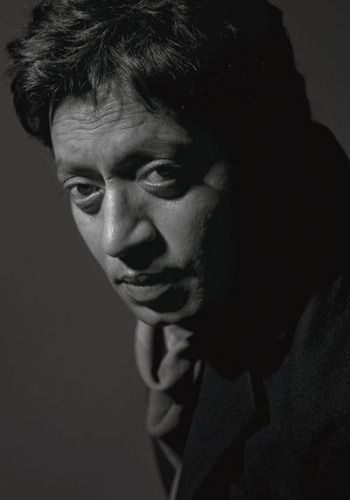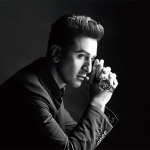A Mighty Journey
He has forayed a long way from his familial home in Jaipur to a suburban Mumbai apartment. Metaphorically, his journey has traversed many more terrains and mindsets than the mere geographical relocation denotes – for he has broken barriers and boundaries to make a mark not just in Hindi cinema but on the international screen as well.
Irrfan, who turns 49 this year, is one of the few Indian actors to straddle the globe for roles that have made him a name worldwide, an achievement done with no song and dance, music and fanfare. With little fuss, the actor played out his supporting role in Slumdog Millionaire, was part of the high-flying repertoire of the soul-stirring A Mighty Heart, showed a great deal of emotional intensity in The Namesake and is on the verge of becoming an iconic global star with The Amazing Spiderman, in which he will play the part of Proto-Goblin, one of the villains, and is also playing the older Pi in Life Of Pi. He is, if one could put it, on the road to becoming an important face of Indian cinema abroad.
On a warm, Saturday afternoon, a few days before he has to fly out to Jaipur, Irrfan agrees to do a shorter trek to the centre of Mumbai for Verve. So, we find ourselves at Rafique Sayed’s Byculla studio, waiting for him to stroll in after navigating the spiral staircase with long-legged ease. True to form, he walks in quietly, as always playing his presence and performance in an understated manner. He is one Khan who has dropped his surname, rather than cashing in on it in a Khan- dominated industry. “My name is much longer,” Sahabzade Irrfan Ali Khan points out. “I felt comfortable with just being Irrfan.”
In between conversations with our stylist, he exchanges remarks in chaste Hindi and Urdu with our photographer, who speaks to him about his aunt, the literary legend, Ismat Chugtai. The eyes of the erstwhile NSD graduate light up at the name as both Rafique and he exchange details and anecdotes about the renowned writer.
Turning point
Perched on a stool in front of the mirror, it does not take us long to make him go down memory route. Young Irrfan grew up in a family that, luckily for him, did not curtail his dreams even though they may not have understood them. Confessing to a desire to initially follow sports, the actor says, “When I was young I used to sneak out and watch films. My family did not understand why I wanted to do that. My father came from a feudal background. He believed in having your talent in your hand, in relying on yourself. He never pushed me in any particular direction. It was my mother who insisted on me going to a particular school as she was more concerned about what I was going to do.”
While checking out the suits lined up in the corner, Irrfan shows a more than adequate knowledge of the designers (one is a Shahab Durazi, while others are from Burberry). With a cup of coffee to warm up, Irrfan rewinds to the defining change in his life which came when he got admission into the National School of Drama – an event that opened up a whole new world to him. “I had nothing, no direction. Little engaged me until I realised I had to learn the craft of acting,” he recalls.
Different dreams
When Irrfan moved to Mumbai for work, he found it difficult to get a break in the movies. And though success on the silver screen eluded him, he plodded on doing multiple roles in television (Banegi Apni Baat, Chandrakanta). But, he says, “At one point I was bored and almost thought of quitting. I was inspired by a certain kind of cinema. I was a strange person. There were atrocious films being made at that time. I couldn’t find my own space but I kept myself busy. I realised that I would have to create my own space. In TV people were doing one pilot a day. I was insistent that I shouldn’t be typecast. I did not compromise on that. I did only what interested me and that took care of the fact that I got a variety of roles to play.”
Though he may have considered it bad luck, the long wait helped hone his talent as an actor and matured him as a human being. For, as he laughs now, “Circumstances have made me what I am. I have been tested severely before I tasted success. In fact, there has been a bit of a delay in whatever I have done. It has been a pattern in my life. But, ultimately I was fortunate that I succeeded so late. Had I got great acclaim early enough, I would have been in a mess. I would have ended up just as a villain.”
Eloquent silences
One of the first things that strikes me about Irrfan when I meet him is his slim tall frame, slimmer than it appears on screen and his eyes that speak more eloquently than his words. Looking at me with a slight twinkle, he remarks, “When I joined films, my eyes were constantly being commented on and criticised. People said I was a druggie. But today, especially after I have signed on roles abroad, the very same eyes and looks are looked upon differently. Everyone talks positively about them now. I have no control over my bulging eyes. And without silences there can be no music. For as Harold Pinter pointed out, it is not important what you say, it is important how you sound.”
It is true that Irrfan is not the conventional chocolate hero material but that is not something he ever intended to be. Tracing the actors who made an impact Irrfan comments, “True, actors are supposed to have good looks. But at the end of the day your appearance does not matter. A good-looking actor can create a persona that can appear ugly and uncouth. And don’t forget that most of the people who ruled the silver screen were not conventional good-lookers.”
Breaking boundaries
It was Asif Kapadia’s The Warrior that put him on the international map. Today, his talent is sought after by many foreign directors and yet he chooses to keep quiet about his tryst with Hollywood. Shy to the point of being reserved at public gatherings in real life, the actor says, “It embarrasses me to go to a party and talk about what I have done. Why should I tell the press when I met Natalie Portman? It is better to speak about my work. I would be embarrassed if my work did not affect people. I want to keep my focus on my craft. I am not a very good talker. I don’t like putting my thoughts into words.”
Though he has said that he has cut down on his smoking, he does enjoy rolling a cigarette and lighting up. Something he does more than once in the course of the afternoon. I realise what he is up to when I turn around to find him missing. He’s back in a few minutes, as quietly as he’d slipped out.
That is what is immensely likeable about the no-fuss-no-frills man. The fact that he has remained grounded, even as success began to dog his footsteps. We chat about a reading of The Namesake where, along with Mira Nair and Sooni Taraporevala, he had been the cynosure of all the attention. Suddenly the lights had gone out but unfazed, Irrfan made the ladies plonk themselves on the steps of the makeshift stage and carried forward the session with ease.
Destiny’s child
It is a composure that has come the hard way. “For ten years I was fighting fate,” he says matter-of-factly. “It frustrated me. But life has its own plans. No one asked me when I came to this planet if I wanted to be here. There is a destiny that is written. You have to align yourself to that.”
He is what he is due to the long wait he’s endured for recognition, personally not just professionally. He smiles in reply, “Slowly I realised what popularity really meant. But by then I knew that though an actor needs appreciation, adulation and praise, it is important only initially. After that, you understand that there’s more substance to it.”
And, as he said in another interview, he hates to be disappointed if things don’t happen. “I refused to read Pi till my role in the movie was confirmed,” he’d mentioned. “I hate to build up expectations. I’ve done enough of that in my life. It’s torturous…. I used to get these kinds of insecurities early in my life, so I’ve built up a kind of defence system.”
Crafted success
Right through, he speaks softly, a slight rhythm in his voice. Often I have to strain to hear his words in a conversation that continues over the phone line the next day. On his work ethics he says simply, “I kept working on myself. But I didn’t work to a particular plan.”
Modestly he rules out the fact that roles are written for him. He is what his character wants him to be and not vice versa and he works hard to get under the skin of the reel persona. On definitely not wanting to be Irrfan on screen, he says, “I do not want to be limited according to my own characteristics. It would then not challenge me in any way. Acting does not come naturally to me. I have to work towards it. It is like being in a place where the director has a world that engages me. I do not enjoy working with directors who depend on me or those who do not challenge me.”
What does inspire him is playing so many people in one lifetime. “I invest in my roles. It’s a product not a guarantee. I am happy to deliver to audience appreciation. I cannot do the mundane,” he says. “Being so many people is the prize. I am sure that I would never have thought about so many things that my films have forced me to do. I have to look at things in a different way and they take me into an area that is beyond my normal experience area. This becomes important to me as a human being.”
Beyond labels
Personally, he would hate being slotted into any one category. “Serious? Thinking actor? Any kind of tag bores me. Life is much more surprising than that. You cannot define it in any slot. I am a very lazy guy. I do things that kindle my heart,” he states.
Yet he bursts out laughing when I point out that he has been also called a hot actor. Admitting that with a smile in his voice, he says, “You like to hear that you are everyone’s fantasy. It is very fortunate to be liked by the other gender.”
His own space
Beyond the screen, he retreats quickly into his own private space. He has two young sons, Babil and Ayaan, who have not really seen their papa in many movies. “Both are old enough to watch movies but not that old that they can watch mine. In fact, I hardly ever watch my own work,” he confesses.
Put him on a set and he sets off sparks, put him in a kitchen and he is out of place. In his own time and space at home, he reads the umpteen scripts that are coming his way, and when abroad, he is glued to his computer while not working. “I don’t know why, for in India I hardly ever use the Internet.”
As far as the power of his performance goes, he modestly says that he does not think about the power he exerts: “I really don’t think on those lines. I am really powerless. I am not here to do great things but just be different people.”
Related posts from Verve:
Verve Trending
Sorry. No data so far.
us on Facebook to stay updated with the latest trends






